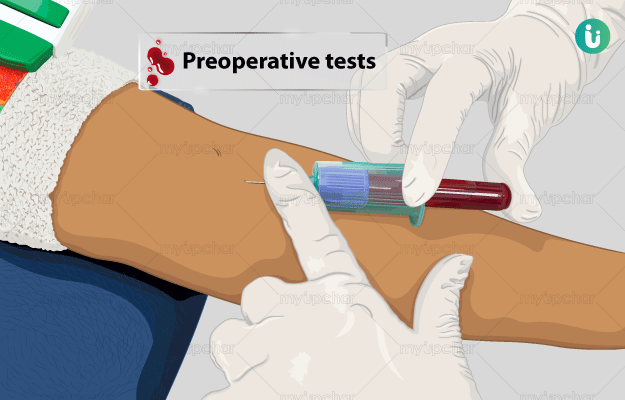What is Pre-Operative Panel?
The pre-operative panel consists of a group of tests that your doctor will perform right before a surgery - the word pre-operative means before a surgery.
It includes the following tests:
- Blood sugar (random): A random blood sugar test checks the level of a type of sugar called glucose in your blood. This test can be performed at any time of the day. Glucose is your body’s main source of energy. A hormone called insulin helps in the transport of glucose into the cells from blood. If your blood glucose levels are high (hyperglycaemia) or low (hypoglycaemia), it may put you at risk of various conditions and prolong healing after surgery.
- ABO incompatibility (blood group and Rh factor): An ABO incompatibility test determines your blood type. It is performed so that you can receive a blood transfusion safely. According to the ABO system, there are four blood types: A, B, AB and O. You inherit your blood group from your parents. A and B are two antigens (proteins) present on the surface of RBCs. Your blood type depends on which of these antigens you have inherited. If you have A antigen on your RBCs, your blood type is A and if you have B antigen on your red blood cells, you have B blood group. If you have neither of them, you are O blood type and if you have both you are AB blood type. This test also checks for another substance known as the Rh factor on the surface of RBCs. Rh factor is either positive or negative. If you are given an incompatible blood type, it may lead to blood transfusion reaction and cause complications. Depending on the incompatibility, blood transfusion reaction can be mild to life-threatening. Read more: Blood group test
- Complete blood count (CBC): A CBC test is an indicator of your overall health and can check for different conditions, such as leukaemia, anaemia and infections. This test provides information on the following:
- The type and number of white blood cells (WBCs): WBCs help in fighting infections. They are of five types - neutrophils, eosinophils, basophils, lymphocytes and monocytes. All of the WBCs perform various specific functions. If the WBC count is high or if any specific type of WBC is high, it indicates that you may have an inflammation or infection in the body, whereas if your WBC count is low, it means you have underlying conditions and are at high risk of getting infections.
- The number of RBCs: RBCs transport oxygen throughout the body and remove the excess carbon dioxide. If your RBC count is low, it could indicate anaemia or another underlying disease. If your RBCs are too high (rare cases), it could cause problems with blood flow and increase your risk of getting blood clots.
- Haematocrit (HCT): The haematocrit test determines the percentage of RBCs in your blood. If your HCT results are low, it could indicate iron deficiency or an underlying health disorder. Low haematocrit levels pose a risk of excessive bleeding. If your HCT results are high, it could be due to dehydration or other disorders. Low HCT levels also indicate that your tissues are getting less oxygen. Abnormal HCT may pose a risk of complications in surgery.
- Haemoglobin (Hb, Hgb): Haemoglobin is a protein found in RBCs. It carries oxygen to the body from lungs. Abnormal Hb values may be seen in conditions like anaemia and lung disease. Just like low hematocrit levels, low haemoglobin also increases the risk of oxygen deficit in patients and increases the need for blood transfusion during surgery.
- Platelet count: Platelets are tiny cells that play a role in blood clotting. A very low platelet count may mean a higher risk of bleeding, while a high platelet count could increase the chances of spontaneous blood clotting in the body.
- RBC indices: CBC also provides information on the mean corpuscular volume (MCV or the average RBC size), mean corpuscular Hb (MCH or the amount of Hb per RBC) and mean corpuscular Hb concentration (MCHC or the Hb concentration per RBC). These indices help identify what type of anaemia you have so appropriate steps can be taken to manage it.
- Hepatitis B surface antigen (HBsAg): This blood test determines if you have a recent or long-standing infection from hepatitis B virus (HBV). HBV has antigens (a type of protein) on its surface that cause an immune reaction. These antigens can be found in the blood within several weeks of the infection. The presence of HBsAg is the earliest sign of HBV infection. The virus causes liver infection and is highly contagious.
- Hepatitis C virus (HCV) antibody: HCV antibody test checks for the presence of special proteins called antibodies in your bloodstream. Antibodies are produced by the immune system to fight infections. Just like hepatitis B, HCV is also contagious.
- Human immunodeficiency virus (HIV) 1 & 2 antibody: HIV is a highly contagious infection caused by the human immunodeficiency virus. HIV virus is of two types: HIV 1 and HIV 2. The virus attacks and damages the immune system, making the person prone to infections. The HIV test is performed to check if you have been infected by HIV. It looks for the presence of antibodies against the human immunodeficiency virus in your immune system. The immune system takes about three to 12 weeks to produce antibodies against HIV.






























